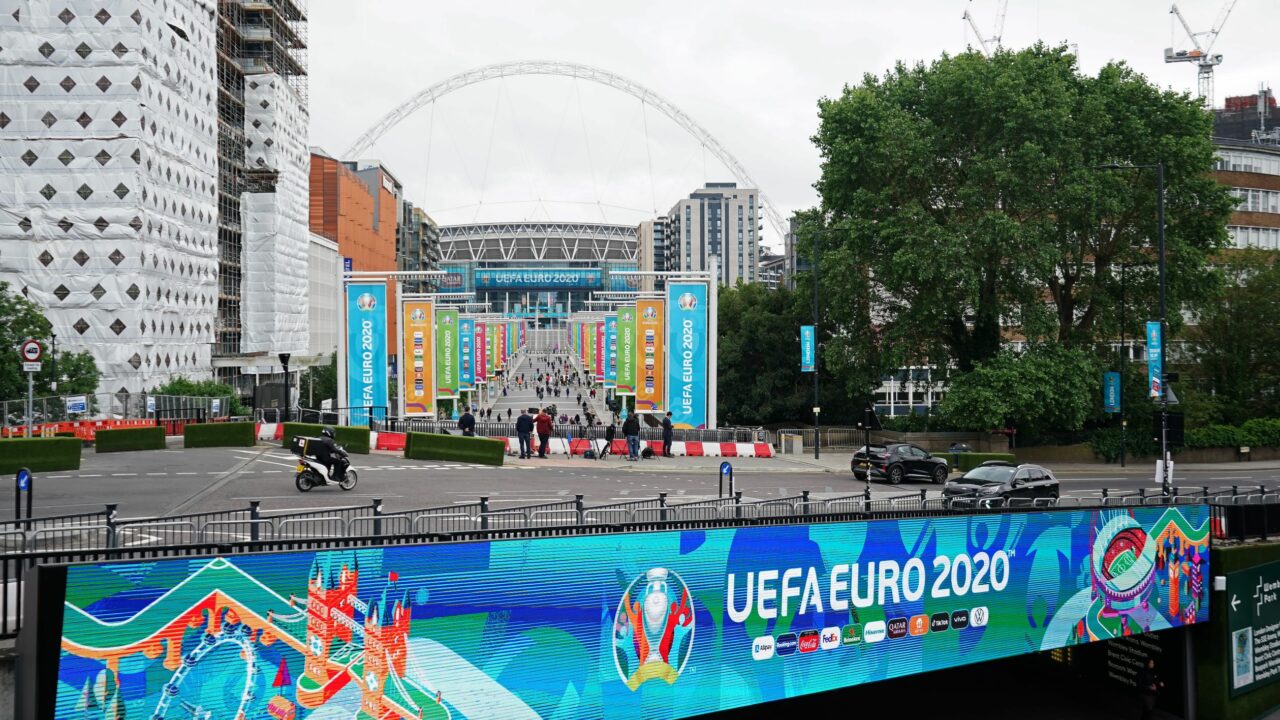The great game: A geopolitical Euros
If policymakers watch closely enough, football might just provide the perspective and insights they need to advance a geopolitical Europe
As much of the world emerges, stumbling, into the post-pandemic era, Europe has done so with a flourish – by showcasing its recovery, and enduring glamour, with a transcontinental football tournament that is enthralling the world. Euro 2020 seems to be the shiniest example yet of the global Europe that Europeans are routinely promised. If we scratch the surface, we even see hints of the geopolitical Europe that was announced in 2019, before it was trumped by the pandemic (much to the relief of those tasked with delivering it). And this is not just because it’s a European tournament, for Europeans, by Europeans, and sponsored by Alipay.
Firstly, what better reflection is there of Europe’s truest nature than a tournament in 2021 that is still labelled as ‘Euro 2020’ because, well, terms and conditions apply? Is there really anything more European than having a shadowy continent-wide organisation forcing the media, a specialist profession, and all others to ignore the reality of their eyes and ears so as to not be unfair to the corporate sponsors and ruin the branding? It’s this devotion to the small print and corporate sensibilities that continues to define us on the world stage, and is the foundation of Europe’s posturing to become the global regulatory powerhouse.
But this very European competition isn’t just a demonstration to the world of global Europe in all its naked, imperfect glory. If policymakers watch closely enough, football might just provide the perspective and insights they need to advance that geopolitical Europe – because, when it comes to sporting competition, Europe cannot simply keep ignoring Russia and Turkey; it actually has to directly engage and compete with them. The results can be quite surprising.
After all, whether it’s on the football pitch or the global stage, Russia is an opponent that punishes attempts to underestimate it. The country of Lev Yashin was considered by all to be diminished after the fall of the Berlin wall – a quaint rather than quality power. This changed in 2008, when European footballing powerhouse the Netherlands was punished by a Russian team that would come to represent the sporting crest of Russia’s cash-rich wave of resurgence across Europe. But our Euros of 2020[1] reveals that the threat of this resurgence might be just a bit overstated. The Russian team might have come to play in their typically rough, confident, and direct way, but this ageing force broke down quite readily against the technical expertise and youthful energy of better-resourced, nimbler, and more modern opponents.
As it turns out, opponents are a lot less menacing once we stop facing them down in our heads and instead do so on the pitch
Turkey is caught up in a similar tale. With Turkish players plying their trade at elite clubs across the continent, a new Turkey – a rising Turkey – was the big pre-tournament story. A great rhetorical offensive was launched, as the narrative of Turkey as the competition’s dark horses filled column inches, spread anxiety throughout Europe, and set up a tense confrontation on the shores of the Mediterranean for the opening of these geopolitical Euros. But, for all the pomp and their impressive displays on the fringes of the main event throughout the qualifiers, Turkey simply didn’t have the firepower, tactics, or stamina to score when it counted.
As it turns out, opponents are a lot less menacing once we stop facing them down in our heads and instead do so on the pitch.
All things considered, this geopolitical Euros has lessons about the continent and for the continent. As France sink from their former global majesty – which, to many, seemed too recent to have faded so quickly – into the acrimony of infighting, they would do well to learn from the Germans. After their fall from grace, Germany roundly turned on their second-generation-migrant superstars, sowing discord amongst those who were friends and co-conspirators in the greatest of footballing successes. For this, they reaped disharmony that still cripples them today.
Better perhaps to learn from England, who kneel together, win together, and are unabashedly contemporary in their approach, tactics, and play – and reap the dividends of solidarity and coherence for it.
As this geopolitical Euros builds towards its crescendo, it reveals perhaps the deepest, darkest fear of geopolitical Europe – that, as with football, the English are coming home and will bring the silverware, prestige, and European pretensions of grandeur with them. Football can divine so much for those who wish to read the tea leaves. But, even at its most basic level, geopolitics is remarkably similar to the beautiful game. If we all play by the international rules in place, glory comes and goes but, on a long enough timeline, everybody wins – and, most importantly of all, there’s no need to involve the Americans.
[1] Terms and conditions may apply.
The European Council on Foreign Relations does not take collective positions. ECFR publications only represent the views of their individual authors.



